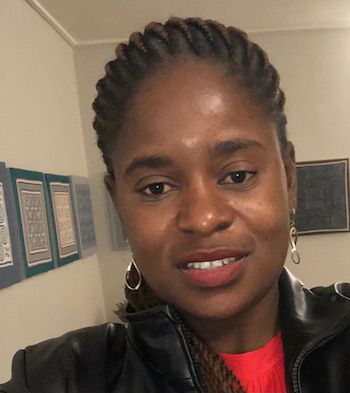Kimberly Mutandiro

Summary: When Kimberly Mutandiro, a Zimbabwean immigrant and independent journalist, arrived in South Africa in 2008, she realised that the voices of refugees and immigrants was often considered irrelevant and mostly silenced by the mainline media. Since then, she has written dozens of articles on members of the immigrant community, exposing discriminatory practices by government officials and xenophobic violence by local anti-immigrant groups. For her work, she has endured hate and threats from extremist groups.
Profile:
Kimberly Mutandiro, journalist and broadcaster for the Zimbabwe Broadcasting Service, fled to South Africa in 2008, searching for a media environment where she could develop her profession. Such an environment was not promising in her home country. On arriving in South Africa, Mutandiro realised that immigrants like her were “only occasionally covered and if they were covered, it was partial. Their voices were hardly included.” Since that time, violence against international immigrants—mostly of African origin and characterised by massive displacements and loss of life and property—has worsened. Mutandiro’s first step toward correcting the situation was to speak to those immigrants “in order to bring their issues to light.”
Putting professional journalism into practice, Mutandiro said, “As a journalist, it is only ethical to give a voice to the voiceless. For me, writing about marginalised persons is a passion because they are often oppressed and left to bear the brunt of social, economic, and political failures by the status quo. My stories thrive in giving a voice to the marginalised because it is only through speaking to them that one can really create empathy and understand their true plight.”
Mutandiro thus began her crusade of writing dozens of articles exposing the exclusion of immigrants from social services as well as xenophobic violence. Perhaps predictably, these stories often triggered hate and threats against her. When she wrote an article about how immigrant children born in South Africa were being excluded from student financial aid because they weren’t locals, she received a barrage of social media attacks from known anti-immigrant groups and others; they condemned her for spreading “nonsense propaganda”.
Mutandiro: “The [feedback from] stories I did on migrants were accompanied by hate speech, either directed at me or just negative comments, where as a migrant journalist I was told to go back to my country. As a result of some of the stories that went viral over the past three months, I suffered a lot of cyberattacks, bullying, and threats, mostly through Twitter.”
“I was accused of being biased towards migrants and told to go back to Zimbabwe,” Mutandiro remembers. “But to be honest, I write mostly about local South Africans. Surprisingly, I do not suffer any attacks when I write about local issues.”
Mutandiro does not constantly sit in an office writing. She travels to areas such as townships and informal settlements that are considered to be hot spots of xenophobic violence.
“When covering xenophobic issues,” she says, “my safety is not guaranteed. I often go to dangerous and unsafe spaces where I can be easily targeted. In 2019 I was even stalked on Facebook and sought out by a community mob in Kwathema who were not happy about a xenophobic incident that I had covered.”
None of these threats, however, have compromised Mutandiro’s journalistic code: “I refused to reveal my sources because I have a duty as a journalist to protect them from potential harm.”
She also believes that despite the attacks, her stories have made an impact: “Reporting on xenophobia is part of advocating against it. I believe that being able to report on such a sensitive and often shielded topic is victory on its own. Yes, exposing such issues will definitely curb injustices against migrants because it’s the only way we can advocate for action against such injustices.”
She is also patient: “Doing away with social injustice is a process. Change begins in the mind. If those with negative attitudes towards immigrants change their mindset, we will see a South Africa which is free from such injustices.”
Besides reporting on international migration, Mutandiro covers issues such as women's rights, children's rights, human rights, and politics and democracy. Though at times feeling hesitant in the face of increasing cyber and physical threats, she believes that journalism taught her bravery and constant vigilance:
“If I was another person, I would have stopped by now. But then if I stop giving migrants a voice when other media outlets silence them, who will?”
